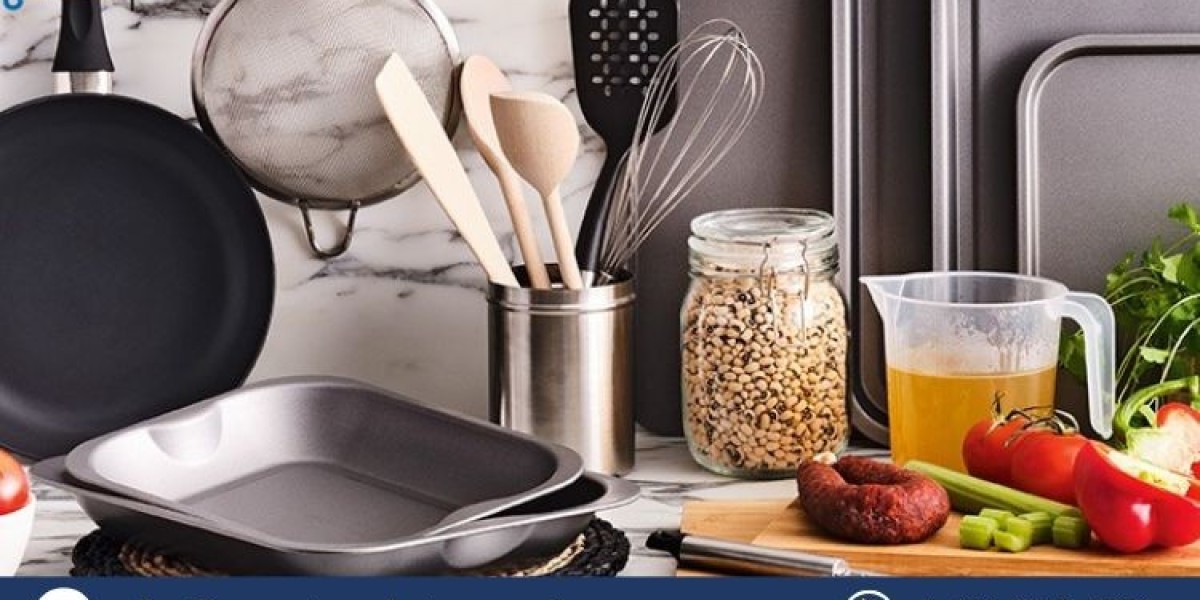The United Kingdom homeware market is poised for steady growth over the next decade, driven by consumer demand for high-quality, functional, and aesthetically appealing products. Valued at USD 14.74 billion in 2024, the market is projected to grow at a CAGR of 4.1% between 2025 and 2034, reaching an estimated value of USD 21.17 billion by 2034. This growth is influenced by evolving consumer preferences, the expansion of e-commerce platforms, and innovations in home design and functionality. In this article, we will explore the key drivers, market dynamics, opportunities, and challenges shaping the UK homeware market.
Market Overview
The United Kingdom homeware market encompasses a broad range of products used for daily living, including furniture, kitchenware, textiles, home decor, lighting, and storage solutions. The market is evolving with increasing interest in sustainability, smart home technologies, and multifunctional products that cater to the needs of modern consumers.
Homeware products in the UK have become an essential part of home improvement and lifestyle, driven by changing lifestyles, population growth, and a higher focus on interior design. The ongoing trend of "home as a sanctuary" has led to increased spending on homeware, as consumers seek comfort, personalization, and style in their living spaces.
Size & Share
The UK homeware market size is valued at approximately USD 14.74 billion in 2024. The market is expected to grow at a CAGR of 4.1% from 2025 to 2034, ultimately reaching USD 21.17 billion by the end of the forecast period.
- Market Share: The homeware market in the UK is highly fragmented, with a mix of large national brands and smaller, niche players. Key product segments driving market growth include kitchenware, home decor, textiles, furniture, and lighting.
- E-commerce Influence: E-commerce has seen significant growth in the UK homeware market, with more consumers opting for online shopping due to its convenience and variety. The trend toward online shopping, particularly for homeware items, is expected to continue influencing the market share distribution, with online platforms capturing an increasing share of overall sales.
The demand for homeware products in the UK is also being driven by the increasing popularity of home renovation and DIY projects, particularly as people spend more time at home, influenced by societal shifts and the work-from-home trend.
Get a Free Sample Report with a Table of Contents:
https://www.expertmarketresearch.com/reports/united-kingdom-homeware-market/requestsample
Market Dynamics & Trends
The United Kingdom homeware market is shaped by various dynamics and evolving trends that influence consumer buying behavior, product offerings, and technological advancements in the sector.
- Sustainability and Eco-Friendly Products: Sustainability has become a significant trend in the homeware market, with consumers increasingly choosing eco-friendly and sustainably sourced products. Many consumers now prioritize brands and products that are made from renewable materials, are energy-efficient, or come with low environmental footprints. Brands offering sustainable homeware items, including recycled or biodegradable products, are gaining popularity.
- Smart Home Integration :The integration of smart technologies into homeware products is another major trend driving the UK market. Consumers are becoming more interested in products that offer convenience and improve their home environment through technology. Examples of smart homeware include smart lighting systems, automated kitchen appliances, and home security devices. This trend aligns with the increasing popularity of home automation and the Internet of Things (IoT).
- Personalization and Customization :Consumers in the UK are seeking homeware products that reflect their personal style and preferences. As a result, there is a growing demand for personalized and customizable products, such as monogrammed towels, bespoke furniture, or custom-made home decor. This trend is fueling innovation in product design, with brands offering more tailored solutions to meet the individual tastes of consumers.
- Multifunctional Products :The demand for multifunctional and space-saving products is rising, particularly in urban areas where living spaces are smaller. Consumers are looking for homeware items that serve multiple purposes, such as expandable furniture, foldable storage solutions, and multifunctional kitchen gadgets. These products provide consumers with practical solutions that maximize space efficiency without compromising on style.
- E-commerce and Digital Transformation :E-commerce has reshaped the retail landscape, and homeware is no exception. Online platforms are becoming a preferred channel for purchasing homeware products due to the convenience of shopping from home, the ability to compare prices, and the wide variety of products available. The growth of direct-to-consumer (D2C) brands and online marketplaces like Amazon, Wayfair, and Made.com is providing increased accessibility to homeware products, further accelerating market growth.
Growth
The UK homeware market is expected to grow steadily over the forecast period, driven by several key factors:
- Increased Spending on Home Renovations :As more consumers focus on improving their living environments, there has been an increase in spending on home renovations. This is contributing to the demand for homeware products such as furniture, lighting, and home decor. The rise of DIY culture and online home improvement resources are fueling this trend, making home renovation more accessible.
- Rise in Disposable Income :The rise in disposable income among UK consumers is enabling greater spending on premium homeware products. As consumer purchasing power increases, there is a growing demand for high-quality, luxury, and designer homeware items, which are expected to account for a larger share of the market.
- Post-Pandemic Shift Towards Home-Centered Lifestyles :The COVID-19 pandemic has fundamentally changed the way people view their homes. With more people working from home, there has been a shift towards creating comfortable and functional living spaces. This has led to increased spending on homeware products that enhance the home environment, such as ergonomic furniture, home office supplies, and cozy textiles.
- Expanding Product Range from Retailers:Retailers are responding to the growing demand for diverse homeware options by expanding their product ranges to cater to a variety of tastes and budgets. Retailers are also investing in product innovation to meet the demand for sustainable, smart, and multifunctional homeware items.
Market Opportunities and Challenges
Opportunities:
Sustainability Trend: As consumers become more environmentally conscious, there is a significant opportunity for companies that offer sustainable, eco-friendly homeware products. Brands that prioritize sustainability can capture the growing segment of eco-conscious consumers.
Expansion of Smart Home Products: There is ample opportunity for businesses to expand their smart home product offerings. As more homes embrace automation and IoT technology, there will be increasing demand for products like smart thermostats, smart lighting, and intelligent kitchen appliances.
E-commerce Expansion: The continued growth of e-commerce presents an opportunity for homeware brands to reach a broader audience through online platforms. Investing in robust online shopping experiences, offering competitive pricing, and ensuring fast delivery will give brands a competitive edge.
Customization and Personalization: Offering customized or personalized homeware products presents a unique growth opportunity, as consumers increasingly seek ways to make their homes more personal and tailored to their tastes.
Challenges:
Supply Chain Disruptions: The global supply chain challenges, including delays and rising costs of raw materials, could impact product availability and increase the price of homeware items. This can affect both manufacturers and consumers in the short term.
Competition from Online-Only Brands: Online-only homeware brands are offering competitive pricing and unique products, posing a challenge to traditional brick-and-mortar retailers. Physical stores need to adapt by improving their digital presence and online offerings.
Economic Uncertainty: Economic instability and fluctuations in disposable income could impact consumer spending, making it a challenge for homeware brands to maintain consistent growth. Economic downturns can lead to more cautious consumer behavior and a preference for lower-priced products.
High Expectations for Product Quality and Service: Consumers are becoming increasingly discerning, expecting superior product quality and customer service. Homeware brands will need to continuously innovate and offer exceptional products and services to maintain customer loyalty.
Competitor Analysis
The UK homeware market is home to numerous well-established companies and emerging brands. Some key players in the market include:
- IKEA :IKEA is one of the leading players in the UK homeware market, offering a wide range of affordable and stylish furniture, home decor, and kitchenware. The brand is well-known for its flat-pack furniture and commitment to sustainability, with an increasing focus on eco-friendly product offerings.
- John Lewis :John Lewis is a major UK department store that offers a broad selection of homeware items, including furniture, textiles, and home decor. Known for high-quality products and excellent customer service, John Lewis remains a key competitor in the premium homeware segment.
- Dunelm :Dunelm is a prominent homeware retailer in the UK, offering a diverse range of products such as curtains, furniture, and kitchen accessories. Dunelm has successfully expanded its online presence, providing a seamless shopping experience for customers.
- Next :Next is a leading high-street retailer in the UK that offers homeware products alongside fashion. With a focus on affordable and stylish home products, Next has carved a significant presence in the homeware market.
- Made.com :Made.com is an online-only brand known for its contemporary and stylish homeware products, including furniture, lighting, and decor. The company focuses on providing high-quality designs at affordable prices, leveraging its online platform for a seamless shopping experience.
Explore our trending Blogs and Reports :
Top Construction Companies
Smoked Bacon and Harm Market








